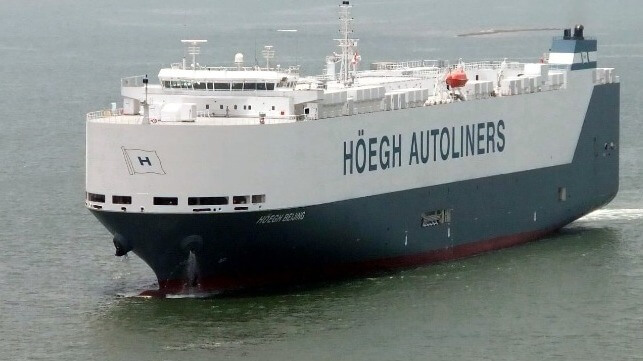Brazil Fines Hoegh and Settles Charges of Collusion with Other Lines

Brazil became the latest country to take action against the car carriers announcing that it has completed a nearly six-year investigation following similar efforts ranging from Australia to South Korea and India, all of which accused the operators of car carriers of collusion and price fixing. Norway’s Hoegh Autoliners was fined while seven other companies and 54 individuals signed agreements with the municipality.
The Administrative Council for Economic Defence (CADE) in Brazil announced its findings on March 23 saying that the “evidentiary elements were sufficient to prove that the collusive conduct affected private bids, negotiations, and contracts carried out between the maritime carriers and vehicle manufacturers.” Counselor Luiz Braido commented that when vehicle manufacturers began the process of contracting or renewing contracts through competition among the carriers, CADE believed there was an exchange of sensitive information, prices were fixed, and the market divided to maintain market share among the carriers. He said the practices affected transport on routes originating in Brazil, as well as when Brazil was the destination or a stopover.
CADE condemned the business practices while announcing that it ruled to fine Hoegh Autoliners and one individual $5.47 million for participating in the practice of an international cartel.
“Höegh Autoliners disagrees with CADE’s decision, and will review its merits thoroughly before making any decision on how to proceed,” the company responded in a stock exchange statement. Hoegh pointed out that the investigation into the supposed breaches of anti-trust regulations dated back to 2000 to 2012, but that the company did not have revenues in Brazil during that period. As such, Hoegh said that Brazil calculated the fine based on a “virtual turnover principle based on Brazil’s relevance in the worldwide PCTC market.” Hoegh can elect to challenge the decision before the federal courts in Brazil.
The company noted that it had cooperated with the investigation in good faith, but “strongly and continuously rebutted any claims of wrongdoings in Brazil.” They noted that the investigation has been finalized in nine jurisdictions and that seven of those investigations resulted in no charges or punitive actions taken against Hoegh Autoliners.

that matters most
Get the latest maritime news delivered to your inbox daily.
In announcing the action against Hoegh, CADE said that it had unanimously decided to also close the case in relation to the companies Mitsui OSK Lines, Nissan Motor Car Carriers, Nippon Yusen Kabushiki Kaisha, Compañia Sud Americana de Vapores, Kawasaki Kisen Kaisha, Wallenius Wilhelmsen Logistics, Eukor Car Carriers, and 54 people. They reported that the companies signed agreements with the municipality undertook to suspend anticompetitive practices and to pay more than $6 million to the Ministry of Justice and Public security.
Brazil’s actions follow similar settlements in Australia with the major car carriers paying significant fines. South Korea’s Fair Trade Commission in 2017 also found that several companies including MOL, NYK, K-Line, Nissan Motor Car Carrier, Hoegh, Wilhelmsen, and others had breached South Korean antitrust law for car carrier services imposing than $37 million in fines. In January this year, India found that four Japanese companies had created and operated a cartel impacting the vehicle transport market fining those companies $8.6 million.
